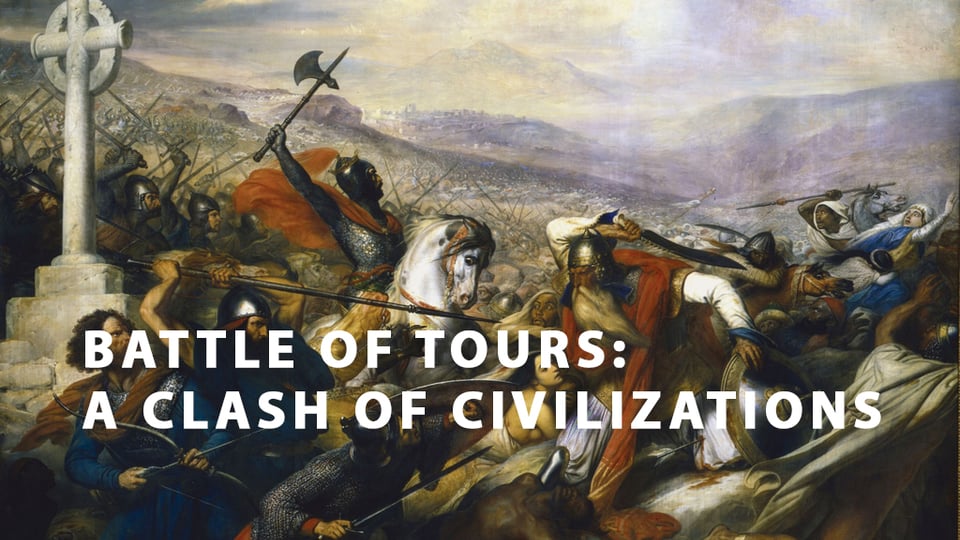Battle of Tours: A Clash of Civilizations
In this historic battle, Europeans fought back Muslim forces attempting to invade Europe. Does Europe face a new kind of Islamic invasion today?

After Muhammad’s death in A.D. 632, his followers waged wars of conquest that led to most people in the Middle East and North Africa being converted to Islam: Syria fell in 634-635; Mesopotamia and Persia, between 633-651; Jerusalem, in 637-638; Egypt, in 642; and all of North Africa was under Muslim control by 709.
With most of the Middle East and North Africa under their control by the early eighth century, Muslim forces looked toward Europe.
Europe under threat
In 711 Muslim forces advanced into Europe by crossing the Strait of Gibraltar onto the Iberian Peninsula (Spain and Portugal), which came under Muslim control in just a few years.
Cathedrals were transformed into mosques. With the Muslim forces so close to France, the entirety of Europe faced the threat of being conquered. The Muslim forces seemed unstoppable, and the end of European civilization was a real possibility.
A new Arab general arose named Abdul Rahman Al Ghafiqi, who was confident that Gaul (France) was within the grasp of the Muslim forces. They invaded in October 732.
In Gaul, Charles Martel, an experienced warrior, had foreseen the threat. He knew that to oppose the Muslims he needed to raise up a professional army. He took church lands to pay for his troops, which caused considerable tension with the Catholic Church. The Muslim armies met the Franks between Poitiers and Tours, about 200 miles south of Paris. The two armies faced each other for six days.
Charles’ army faced superior numbers of mounted and armored Islamic forces. However, the Muslim forces were not prepared for the intense cold. On the seventh day, the Islamic forces finally attacked the Franks. During the hard fighting, Charles sent troops around and behind the line of battle to plunder the riches that the Muslim armies had collected.
Some Muslims broke ranks to protect their riches. This led to rumors of retreat among the Muslims, and eventually they broke ranks and fled. In the chaos Abdul Rahman was surrounded and killed. The Islamic forces retreated to Iberia.
It was in the Battle of Tours that Charles earned the nickname Martel, meaning “the hammer.” He was, and still is, considered the savior of Christianity and European civilization.
A new type of invasion?
In recent years Europe has seen another form of Islamic invasion—this time through immigration. Millions of Muslims have migrated to European cities, some fleeing war and others looking for economic opportunity. There are fears among Europeans that Islam might conquer Europe after all, this time without even fighting a war.
In recent years Europe has seen another form of Islamic invasion—this time through immigration.
Muammar Gaddafi, the late Libyan dictator, spoke these chilling words in 2006: “We have 50 million Muslims in Europe. There are signs that Allah will grant Islam victory in Europe—without swords, without guns, without conquest—will turn it into a Muslim continent within a few decades.”
The changing face of Europe has led to a rise in popularity of many far-right groups campaigning against Muslim immigration, such as Pegida and AfD in Germany, the National Front in France and the Party for Freedom in the Netherlands.
A coming European religious revival
Christianity doesn’t currently play a large role in secular Europe. However, there are signs that religion is being elevated to the foreground of European politics. Consider these headlines:
- Anger Over Belgian Politician’s “Misleading” Claim Muslims Will Soon Outnumber Practising Christians in Europe.
- Europe Under Attack: Isis Target Pope Francis and the Vatican.
- Archbishop of Strasbourg: “Muslims Say France Will Be Theirs.”
- Islam Is Taking Over Europe—“Without Swords, Without Guns, Without Conquest.”
- Hungarian Leader Rebuked for Saying Muslim Migrants Must Be Blocked “to Keep Europe Christian.”
Bible prophecies reveal the Catholic Church will play a large role in uniting 10 nations (or groupings of nations) under a charismatic political leader (Revelation 17:1-13). As Islam continues to make inroads into Europe, the question of identity and Christianity will become more prominent and important. Recent popes have continued to exhort Europe to rediscover their Christian (read: Catholic) roots.
Could the possibility of the demise of Christian European civilization inspire Europeans to begin heeding these calls?
To learn more about these prophecies, read “The Migrant Crisis: What Does It Mean?” and “The European Dream and the Papacy.”
Date Posted: September 27, 2017



